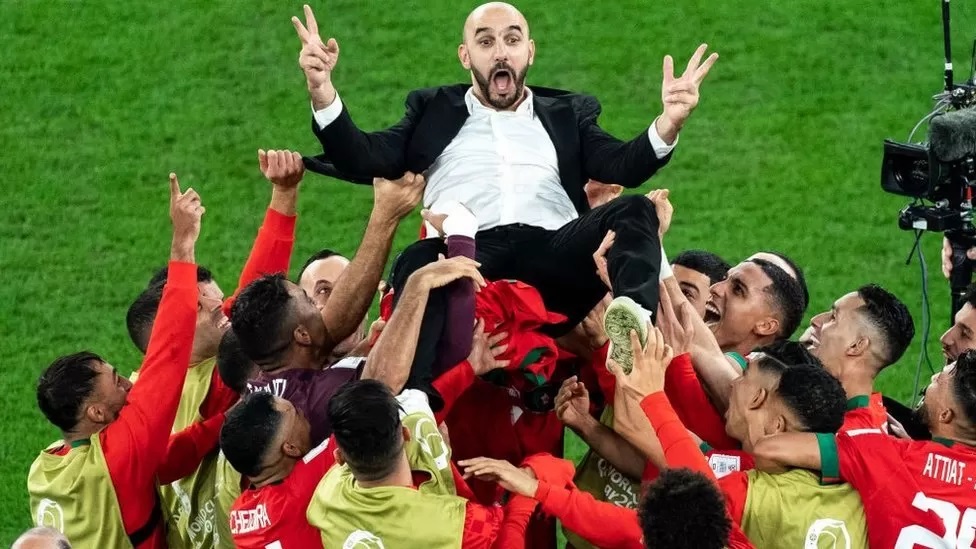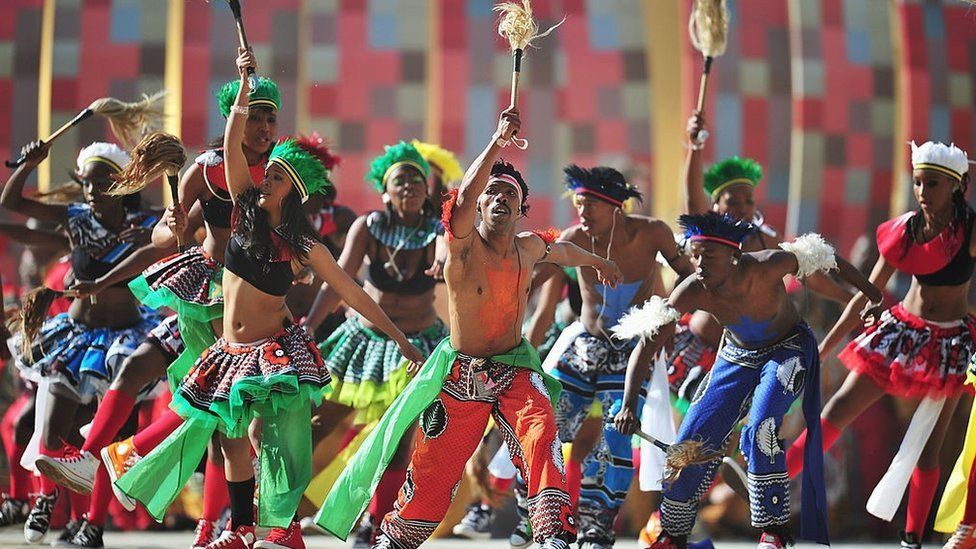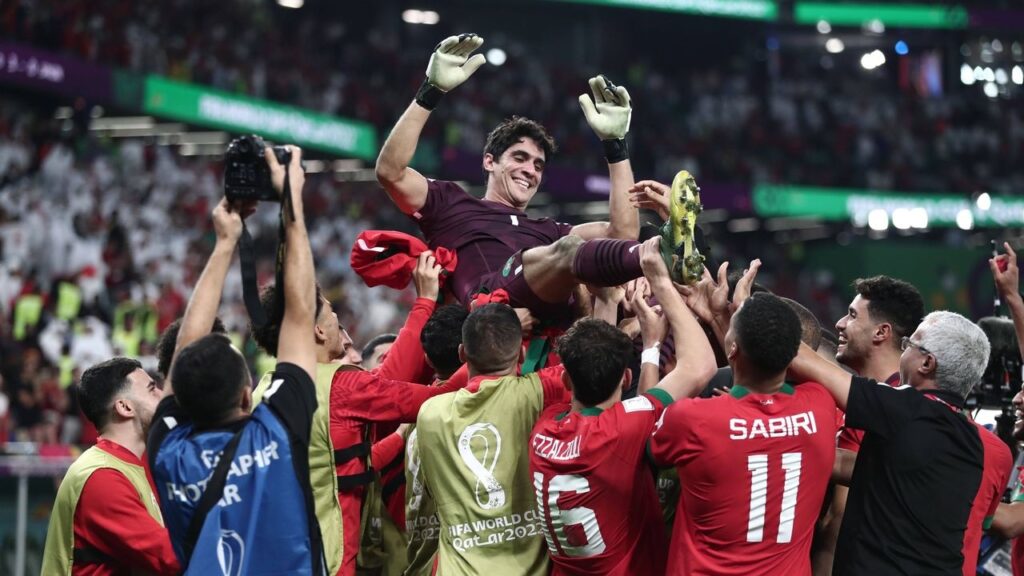
The world’s biggest party took place at Education City stadium in Doha on Tuesday night when Morocco upset Spain in the 2022 Fifa World Cup round of 16.
The vast majority of the 44,000-strong crowd was overwhelmed by emotion after Morocco defender Achraf Hakimi sealed victory with a cheeky panenka penalty kick.
Moroccans poured out into the streets of Casablanca, Rabat, Marrakesh, and practically every capital city in Western Europe to celebrate.
Even King Mohamed VI joined the jubilant crowds.
After the team danced, hugged and cried in the dressing room, coach Walid Regragui made an extremely important declaration in his post-match press conference.
« At some point in Africa, we have to be ambitious and why not win the World Cup, even if it’s going to be hard, » he said.
The declaration was a sign of a paradigm shift in how African nations approach the World Cup, and it is fitting that it came from Regragui, who represents a paradigm-shift in African coaching.
Not only did he cut his teeth on the continent, spending his formative years coaching domestic football in Morocco, he is also part of the inaugural Caf Pro Licence class of 2018 – the very first group of coaches who secured football’s highest coaching diploma entirely on the continent.
He represents everything that is right in African football: He’s young, competent, cosmopolitan, fearless and a pan-Africanist at heart.

Senegal’s Aliou Cissé, Algeria’s Djamel Belmadi, Tunisia’s Radhi Jaidi and South Africa’s Benni McCarthy are other examples of the new African coaching prototype.
It is no coincidence that the 2022 World Cup was the first time all five African nations had African coaches to lead them.
But is Regragui right? Should Africa be asking itself if it can win a World Cup?
As an African football journalist, I often dread the week ahead of World Cups because, without fail, at least one Western media outlet will ask me about Pele’s apocryphal mid-1970s prediction that an African team would win the tournament before the year 2000.
In the past, I mostly offered a cursory shrug of the shoulders, and replied that Pele said a lot of things that did not necessarily mean much, and left it at that.
This year, however, I re-considered my dismissive response.
In November, Cameroon football federation president Samuel Eto’o Fils declared that he was expecting Cameroon to beat Morocco in an all-African final.
He was immediately ridiculed online, mostly by his own compatriots, but his statement elicited a different response from me – it piqued my curiosity.
« What stopped an African team from winning a World Cup in years past? » I asked myself.
It begins with the colonisation of the continent.
The unfortunate reality is that throughout the seven World Cups that took place from 1930 to 1962, Egypt in 1934 was the continent’s sole representative.
That is partly down to the brutal colonisation of the continent by Western European nations, and partly down to Fifa’s former bosses refusing to grant Africa an automatic place at the tournament, even for countries that had gained independence.

In 1966, the African continent boycotted the World Cup in England to send a message to Fifa that it demanded a guaranteed place at the tournament, which it then secured in 1970.
Over the next three decades, African teams managed brilliant upsets, including Algeria defeating West Germany, Morocco dispatching Portugal, and Cameroon bludgeoning Argentina (in more ways than one).
Despite this, Fifa continued to drag its feet, awarding African nations only two places in 1982, three in 1994, and then five in 1998.
So one reason Africa is yet to win a World Cup is that it has barely been participating.
Some might point to poor results in the last 12 years, but who is to say that increased participation would not have led to increased competition and improvement?
The prize money for simply participating in the World Cup could have been injected into grassroots football around the continent, significantly improving the quality of play.
Nearly a century after the inaugural World Cup was hosted in Uruguay, Africa will finally be awarded a more equitable number of places, when we will have 9.5 places in 2026 – inching us a bit closer to global parity.
The 2022 World Cup has also shown us that a lack of representation, not only in the form of qualification slots, but also in the form of hosting rights, can be extremely influential.
South Korea made the semi-finals in 2002 when they co-hosted the tournament, while the Black Stars of Ghana were a penalty-kick away from the semi-finals in 2010 in Africa’s first World Cup in South Africa.
Is it merely a coincidence that Africa and Asia’s best ever finishes came the only time the continents have hosted the tournaments?
The 2022 World Cup has shown us that the answer is: probably not.
Three Asian sides qualified for the knockout stages this year, and the Qatar World Cup has been, by far, the most successful tournament ever on the pitch for African countries.
The 24 cumulative points out of their 15 group stage matches smashed a previous record of 15 points set in the 2002 tournament.
Maher Mezahi
Morocco believe that they are 270 minutes from being champions of the world. Maybe it is time that we also believe them »Maher Mezahi
Journalist
Cameroon became the first African nation to beat Brazil at a World Cup tournament, Tunisia scored a victory over reigning champions France, and Morocco became the first African nation to win a group, with seven points to their name.
Watching droves of Saudi, Moroccan and Tunisian supporters spur their teams on to historic victories has been a breath of fresh air.
The cherry on top of this « World Cup of upsets » would be if Morocco could speak Regragui’s words into existence and win the competition.
When considering how stoutly they defend and how good their goalkeeper Yassine Bono is, they will always have a chance in tournament play.
Morocco believe that they are 270 minutes from being champions of the world. Maybe it is time that we also believe them.

World Opinions – BBC News




 World Opinions Débats De Société, Questions, Opinions et Tribunes.. La Voix Des Sans-Voix | Alternative Média
World Opinions Débats De Société, Questions, Opinions et Tribunes.. La Voix Des Sans-Voix | Alternative Média




